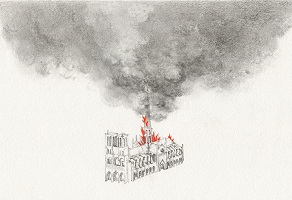Leo Lowenthal’s Legacy: The Relevance and Response of Critical Theory to Authoritarianism, Austerity and Antisemitism Today. An Interview with Martin Jay
Leo Lowenthal’s Legacy: The Relevance and Response of Critical Theory to Authoritarianism, Austerity and Antisemitism Today. An Interview with Martin Jay
Author(s): Katrin Stoll, Martin JaySubject(s): Jewish studies, Sociology, Social Theory, History of Antisemitism
Published by: Instytut Slawistyki Polskiej Akademii Nauk
Keywords: antisemitism; authoritarianism; Critical Theory; Institute for Social Research; Frankfurt School; Leo Lowenthal; Jewish motifs; utopian impulse; racket society; nicht mitmachen;
Summary/Abstract: The interview is concerned with the legacy of Leo Lowenthal (1900–1993), who was born into a Jewish family in Frankfurt am Main, Germany. Lowenthal belonged to the first generation of Critical Theorists under Max Horkheimer’s directorship at the University of Frankfurt Institute for Social Research. Taking Lowenthal’s understanding of Critical Theory as their point of departure, the interlocutors – Katrin Stoll and Martin Jay – discuss ways of renewing Critical Theory in general and the necessity of thinking as a form of negation in particular. The interview provides reflections on the current political situation brought about by the global capitalist order, which owes its stability to both objective social processes and to authoritarianism, austerity, autocracy, antisemitism, racism, and fascization. Recasting Critical Theory in new ways, requires, as Martin Jay forcefully argues, creative theoretical experimentation. By way of example, the interlocutors engage in a joint critical rereading and reevaluation of Leo Lowenthal’s and Norbert Guterman’s 1949 book Prophets of Deceit: A Study of the Techniques of the American Agitator, recently reissued in Germany. Adopting the concept of “racket society”, which was developed by the Critical Theorists in the 1930s and 1940s, after their emigration from Nazi Germany, Martin Jay provides an analysis of current society and political culture in general and the United States in particular. He makes the point that the strongman/client relationship becomes possible through an internalization of patterns of domination as well as by loyalty and protection. The interview closes with a reflection on why it is important to criticize the false way of life and in so doing opening up the possibility of a life that is not wrong.
Journal: Studia Litteraria et Historica
- Issue Year: 2021
- Issue No: 10
- Page Range: 1-17
- Page Count: 17
- Language: English

